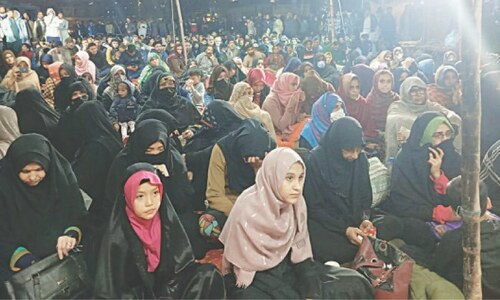
KARACHI: The National Academy of Performing Arts (Napa) in collaboration with the English Speaking Union of Pakistan (ESUP) held a programme titled ‘Instrumental voyage across Pakistan’ on Monday evening, showcasing melodies from different parts of the country.
The event was carrying on smoothly when at the beginning of its second segment a power outage caused a disturbance, affecting the keynote speech delivered by Prof Paul Heritage, a professor of Drama and Performance and Director People’s Palace Projects at Queen Mary University of London.
Unfortunately, he delivered most of his address without stage lights or the microphone, making his talk quite inaudible. No effort was made during that period to restore electricity or put the programme on hold.
The evening started off with members of Napa’s music faculty playing folk compositions — introduced by Omar Jamil — from Pakistan and the last one, a medley of English tunes. The first tune represented Punjab, followed by music from Sindh, Balochistan, Khyber Pakhtunkhwa, Kashmir and Gilgit-Baltistan.
After the music, Prof Heritage was invited on stage to deliver his keynote speech on ‘How can the arts build resilience, resistance and recovery of people and communities’.
He thanked the academy for hosting the concert and presentation and said when he read Napa’s website he read the phrase ‘epitome of creative freedom’ which was relevant to his talk because freedom is something that one has to negotiate. “One person’s freedom is another person’s oppression and that’s what the artists do: find a space for negotiation, mediation by which we can practise our freedoms.”
Prof Heritage said the research they do at the People’s Palace Projects is about what place culture and arts occupy in people’s lives. “We look at how the arts crate space for resilience, resistance when we need it and recovery when trauma affects both individuals and communities.”
He said the People’s Palace is a building at Queen Mary built as an institution for the communities of East London, migrant communities. “When I joined the university we created the People’s Palace Project to think about what the university can do to support local communities and how we can learn from global communities. How the arts work, what difference do they make in our lives!”
At that point he tried to show a short video but as soon as the video was put on, the electricity went off. After that, the professor spoke for 10 minutes or a bit more in that condition.
Earlier, Aziz Memon, patron-in-chief of the ESUP, delivered the welcome address.
Published in Dawn, January 30th, 2024















































Dear visitor, the comments section is undergoing an overhaul and will return soon.